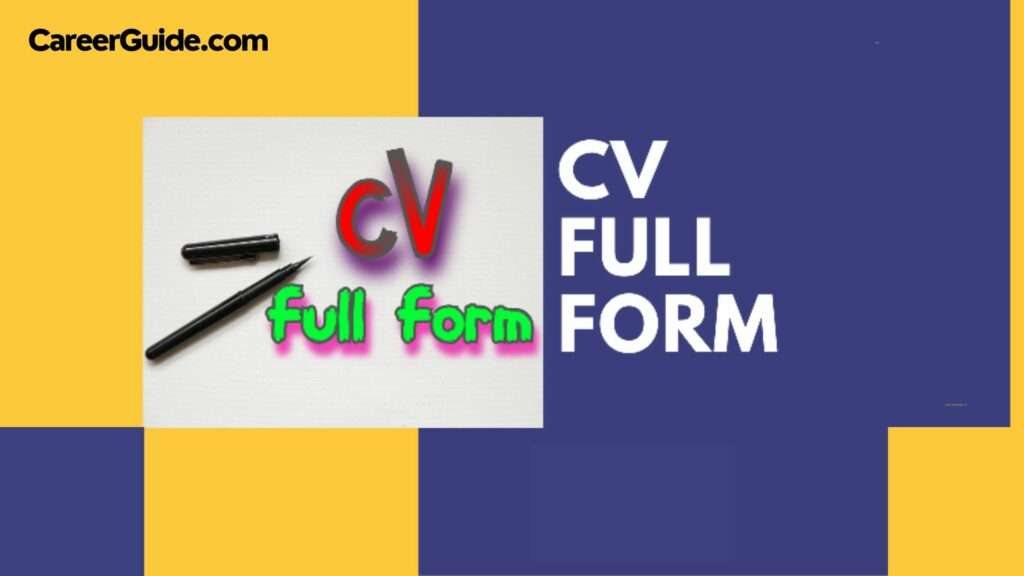Want create site? Find Free WordPress Themes and plugins.
CV Full Form stands for Curriculum Vitae. It is a document that provides an overview of a person’s educational and professional background, typically used when applying for a job or academic position. A CV includes details such as personal information, education, work experience, skills, and achievements.
Purpose of CV
The purpose of a CV (Curriculum Vitae) is to showcase one’s qualifications, skills, and experiences to potential employers or academic institutions. It serves as a comprehensive summary of an individual’s professional and educational background, highlighting their achievements and suitability for a specific role or position.



CV Components
- Personal Information: Name, contact details, and professional profiles.
- Summary or Objective: A brief overview of your career goals or professional profile.
- Education: Details of your academic qualifications, including degrees, institutions, and dates.
- Work Experience: Information about your previous employment, including job titles, companies, and dates.
- Skills: A list of relevant skills and competencies.
- Achievements: Notable accomplishments and recognitions in your career or education.
- Certifications and Training: Any additional certifications or specialized training.
- Projects and Publications: Details of relevant projects or publications you have been involved in.
- References: Optional section providing contact information of professional references.
CV Format
- Contact Information: Include your full name, phone number, email address, and optionally your address.
- Personal Statement or Objective: A brief statement highlighting your career goals and key qualifications.
- Education: List your educational background, including degrees, certifications, and relevant coursework.
- Work Experience: Detail your professional experience, including job titles, companies, dates, and key responsibilities.
- Skills: Highlight your relevant skills, such as technical proficiencies, languages, or soft skills.
- Achievements: Mention any notable achievements, awards, or recognitions.
- Projects: Describe any significant projects or research work you have completed.
- Publications: Include any publications, articles, or research papers you have authored or contributed to.
- References: Optionally, provide references or testimonials from previous employers or academic mentors.
CV Writing Tips
When writing a CV (Curriculum Vitae), consider the following tips to create an effective and impactful document:
- Tailor it to the job: Customize your CV based on the specific job requirements and highlight relevant skills and experiences.
- Keep it concise: Use clear and concise language to convey your qualifications and avoid excessive details.
- Use a professional format: Follow a consistent and organized format, including headings, bullet points, and appropriate sections.
- Highlight achievements: Emphasize your accomplishments and quantify them with specific examples or metrics.
- Include relevant keywords: Incorporate industry-specific keywords and phrases to enhance visibility for automated applicant tracking systems.
- Proofread for errors: Thoroughly proofread your CV to eliminate any grammatical or spelling errors.
- Use a professional tone: Maintain a professional tone throughout your CV, and avoid using jargon or slang.
- Include a personal statement: Write a brief and compelling personal statement that showcases your skills and career aspirations.
- Update regularly: Regularly update your CV with new experiences, skills, or certifications as you progress in your career.
- Seek feedback: Ask for feedback from trusted colleagues or professionals to ensure your CV is polished and effective.
CV vs Resume
| CV | Resume |
|---|---|
| Comprehensive document | Brief summary |
| Detailed information about education, research, publications, and academic achievements | Focused on work experience, skills, and accomplishments |
| Used in academic, research, or international job applications | Commonly used in business, industry, or job applications within the same country |
| Length can vary and typically longer | Usually one to two pages in length |
| Less customizable, follows a standard format | Can be tailored to specific job applications |
Importance of a Good CV
- First Impression: Your CV creates the first impression on potential employers or recruiters, highlighting your qualifications and skills.
- Job Application: A strong CV increases your chances of being shortlisted for job interviews and opportunities.
- Showcase Your Achievements: It allows you to showcase your academic achievements, work experience, skills, and accomplishments in a concise and organized manner.
- Differentiation: A good CV helps you stand out from other applicants by highlighting your unique qualities and relevant experiences.
- Professionalism: It demonstrates your professionalism, attention to detail, and ability to effectively communicate your qualifications.
- Personal Branding: A well-written CV helps build your personal brand and presents you as a competent and desirable candidate.
- Career Progression: A strong CV can open doors to new career opportunities, promotions, and advancements.
Common CV Mistakes
- Spelling and Grammar Errors: Poor spelling and grammar can create a negative impression. Always proofread your CV thoroughly.
- Lack of Focus: Ensure your CV is tailored to the specific job or industry you are applying for, highlighting relevant skills and experiences.
- Lengthy CV: Keep your CV concise and focused. Avoid unnecessary details and prioritize relevant information.
- Missing Contact Information: Provide accurate and up-to-date contact information, including your phone number and email address.
- Lack of Achievements: Instead of just listing responsibilities, highlight your accomplishments and quantifiable results.
- Poor Formatting: Use a professional and consistent format, with clear headings and bullet points for easy readability.
- Irrelevant Information: Include only relevant information that showcases your qualifications and experiences for the specific role.
- Lack of Keywords: Tailor your CV to include keywords and phrases relevant to the job description, making it more likely to pass through automated screening systems.
- Inconsistent or Unprofessional Tone: Maintain a professional tone throughout your CV and use consistent language and formatting.
Most Popular Links
Did you find apk for android? You can find new Free Android Games and apps.






